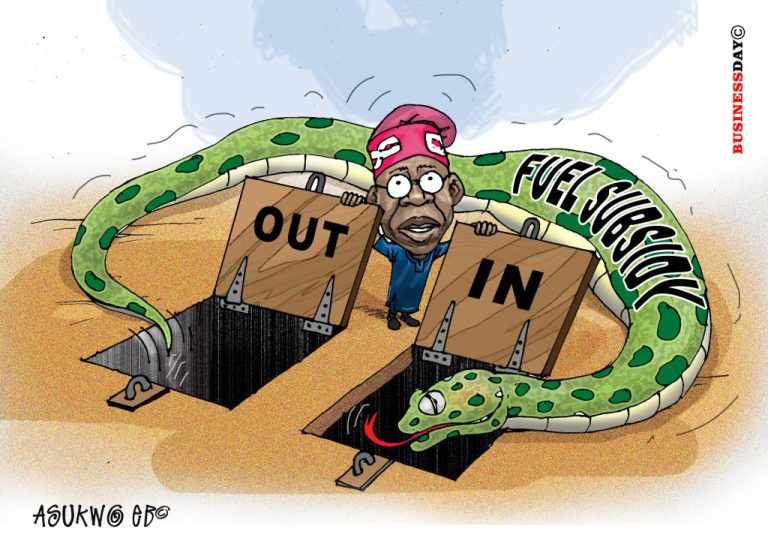Rising crude oil prices are set to send Nigeria’s ‘secret’ bill for fuel subsidies rocketing, threatening to exacerbate the already precarious economic situation of Africa’s largest oil producer, BusinessDay’s findings have revealed.
Brent, the benchmark for Nigeria’s crude oil, has gone from an average of $77 in January to as much as $86 per barrel as of Tuesday.
Although the rising price of crude oil could help in boosting funding for the country’s 2024 budget, which has a benchmark of $77.96 per barrel, the country has been unable to meet its production quotas as its declining production means it cannot increase crude oil revenue from oil sales.
Higher oil price also translates to a larger petrol subsidy burden on the Nigerian National Petroleum Company (NNPC) Ltd.
This is because the Federal Government has forced a lid on the retail price of petrol, even as the landing cost has long crossed the pump price, leading to the conclusion that the government has begun subsidising the commodity.
“A combination of higher exchange rate, higher oil price, and static retail price of petrol means higher petrol subsidy bill as Nigeria’s lack of refining capacity means it imports all the petroleum products it uses locally,” Charles Akinbobola, a Lagos-based energy analyst, said.
He added: “Nigeria’s petrol subsidy programme remains a contentious issue. While intended to cushion the blow of high pump prices for consumers, its true cost and funding mechanism are often shrouded in secrecy.”
There are reports that the NNPC was using proceeds from Nigeria LNG dividends to pay subsidies on petrol while other reports suggest the state-owned company deducts the subsidy amount from the proceeds of Nigeria’s crude oil sales before remitting the remaining balance to the federation account.
The exact amount deducted by NNPC remains unclear. Estimates suggest it could be as high as N17.72 billion daily, raising concerns about transparency.
“It is expedient that its accounts are published such that the general citizenry in whose interests the NNPC manages these resources are apprised of its dealings,” said Faith Akinnagbe, an energy lawyer with the Lagos-based Center for Development Studies.
The Federation Account Allocation Committee report last August (when the exchange rate averaged $770) indicated that over N169 billion was used to pay subsidies, a development that reveals what the country is up against.
Efforts to get Olufemi Soneye, chief corporate communications officer at NNPC, to confirm if the federal government has reverted to petrol subsidy proved abortive.
“At least before, we knew what NNPC was paying in subsidy because of monthly reports that the NNPC no longer regularly issues. Now nobody knows anything. Everything is now in secrecy,” Akinnagbe said.
The World Bank had said since last December that Nigeria has a partial subsidy in place and that petrol should be priced at N750 per litre at the pumps.
“It does seem like petrol prices are not fully adjusting to market conditions so that hints at the partial return of the subsidy, if we estimate what is the cost reflective of the retail PMS price of the would-be and assuming that importation is done at the official FX rate,” Alex Sienaert, the bank’s lead economist for Nigeria, said.
While responding to questions about whether the government has returned fuel subsidy according to the World Bank claim, Olu Verheijen, the special adviser to the President on Energy, said that governments across the world intervene at difficult times to address economic hardship by way of subsidy.
Although she did not state in clear terms whether the subsidy has fully returned, she said the government is doing all in its power to maintain the price of fuel to cushion the impact on the citizens.
“The subsidy was removed on May 29. However, the government has the prerogative to maintain price stability to address social unrest. They reserve the right to intervene,” she said.
President Bola Tinubu, during his inaugural speech on May 29, 2023, declared that the subsidy on petrol was gone, a declaration that was effectively implemented the next day by the NNPC.
Before Tinubu’s declaration, the pump price of petrol was below N190/litre; it jumped to over N500/litre after the President’s statement and moved up again to over N600/litre a few weeks later.
The government had promised to reinvest gains of the subsidy removal into critical areas of the economy but with 80 percent more cash than they got before, nothing has changed particularly at the state level.
The government argued that eliminating subsidies would free up funds for infrastructure development and social programs. However, citizens grapple with rising transportation costs and a general increase in the cost of living, with little evidence of significant improvements.
Proponents of subsidy removal believed it would curb corruption and inefficiencies associated with the program. Additionally, the freed-up funds were expected to be directed towards vital areas like road construction, healthcare, and education.
However, critics argue that the government has not effectively channelled the saved funds into these sectors as transparency around how the saved money is being spent remains a concern.

